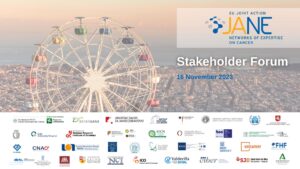The meeting, organised by Biosistemak, was held on 16 November 2023 in a hybrid format.
 The JANE Stakeholder Matrix is made up of a total of 21 organisations from across Europe including patient organisations, universities, the private and public sector, and EU industry. This first Stakeholder Forum brought together a total of 133 people in a hybrid format that included a face-to-face meeting in Barcelona and the opportunity to connect online. It was attended by 11 stakeholders from eight European countries who shared their impressions and knowledge.
The JANE Stakeholder Matrix is made up of a total of 21 organisations from across Europe including patient organisations, universities, the private and public sector, and EU industry. This first Stakeholder Forum brought together a total of 133 people in a hybrid format that included a face-to-face meeting in Barcelona and the opportunity to connect online. It was attended by 11 stakeholders from eight European countries who shared their impressions and knowledge.
The event aimed to enhance dialogue and collaboration between key actors in the European cancer health ecosystem through the exchange of experiences and the establishment of new links that can contribute to sharing advances and exploring opportunities to strengthen the impact of Networks of Expertise (NoEs).
Some of the topics discussed among the experts were the added value that NoEs bring to the European cancer health ecosystem, and how organisations external to the project can contribute to the creation and functioning of these networks. Exploring patient involvement in NoEs was also discussed.
The following are some of the key issues discussed during the event:
- Lessons learned from other European networks: Paolo Casali (Director of the Medical Oncology Unit, Istituto Nazionale Tumori, Milan, Italy) highlighted the importance of exploring and learning from problems identified in other European networks, such as the European Reference Networks (ERNs). Especially on the connection and communication between these networks at national and regional levels. Improving interconnectivity would facilitate the transfer of knowledge from these networks between the different levels, thus contributing to the long-term sustainability of the networks.
- The main challenge – strengthening the network in the EU cancer health ecosystem: While acknowledging the European Commission’s support for these initiatives, it was underlined that the real challenge lies in strengthening the networks in the EU cancer health ecosystem and demonstrating their added value at the European level.
- Diversity between countries: Brina Zagar (Project Manager at Slovensko Zdruzenje Bolnikov Z Limfomom in Levkemijo, Slovenia) pointed out the significant differences between different European countries, such as legislation and access to therapies, highlighting the importance of considering these disparities when making connections.
- Inequities in ERNs and potential for NoEs: one of the main criticisms of inequalities in ERNs regarding access to resources in different countries was discussed. It was emphasised that NoEs can overcome some of these geographical limitations by sharing knowledge, for example by increasing awareness of the best treatment options and availability of resources in each country.
- The key role of patients: Wannes Van Hoof (JANE Patient Involvement work package leader, Sciensano, Belgium) highlighted the shift in the patient communication/teaching model, where the patient is considered an expert and a valuable source of knowledge. The need for dialogue and co-creation, including patient organisations in the network from the early stages, was discussed.
- Challenges in patient involvement: The phenomenon of “cherry picking” and the importance of not judging the legitimacy of a judgment based on professional opinions or interests were addressed.
- Importance of Member State support: The importance of understanding how Member States will support these networks was highlighted and advocated for the direct involvement of legal representatives in the discussions to get their feedback.
- Interconnection between different actors: Miriam Dalmas (Medical Consultant in Public Health, Medical Directorate Office, Department of Health Policy, Ministry of Health, Malta) emphasised the need to learn from existing European models to ensure effective interconnection between different actors in future networks.
- Mechanisms to involve all key stakeholders: Search for mechanisms to involve all key stakeholders, incorporating actors such as Comprehensive Cancer Centres (CCCs) or European infrastructures and sharing fundamental principles with the experience of the ERNs.
Ultimately, the first JANE Stakeholder Forum highlighted the need to address operational challenges in networks, strengthen connections in the EU cancer ecosystem and promote inclusive participation to ensure the sustainability of expert networks.
For more information on the project, visit the official website: https://jane-project.eu/





